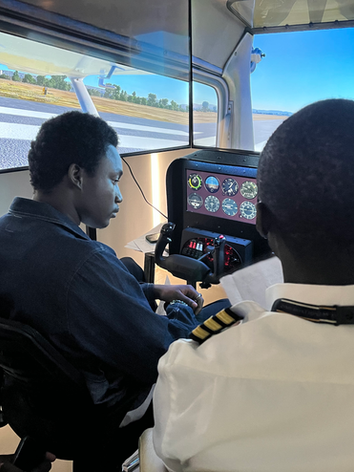

Experience the Thrill of Flight at Zino Aviation Simulator Experience in Lagos
Welcome to Zino Aviation's Premier Flight Simulator Experience!
Whether you’re a budding pilot, an aviation enthusiast, or just looking for a unique outing in Lagos, our state-of-the-art flight simulator offers an unforgettable experience. Step into the cockpit and take control under the guidance of our certified flight instructors.
No previous flying experience? No problem! We’ll teach you the basics and get you flying in no time!
Who Can Fly?
Our flight simulator experience is open to everyone:
Aviation Enthusiasts: Dive deep into the world of aviation, experiencing what it’s like to pilot an aircraft.
Families: Looking for a fun and educational activity for the kids?
Our simulator is perfect for young aspiring pilots and parents alike.
Unique Gifts: Give the gift of flight! Perfect for birthdays, anniversaries, or any special occasion that calls for something truly out of the ordinary.
Corporate Events: Elevate your team-building events with an exhilarating and memorable flying experience.
What should I expect when I turn up for a session?


-
Pre-Flight Introduction: Begin your adventure with a comprehensive briefing from our certified flight instructors. You’ll learn the fundamentals of aircraft operations and flight principles, equipping you with the knowledge you need before taking the controls.
-
Hands-On Flying: Experience the thrill of piloting with hands-on control of the simulator. Under the guidance of our instructors, you’ll navigate through takeoffs, landings, and in-flight manoeuvres, simulating real-world scenarios in a variety of weather conditions.
-
Photography and Videography: Capture every moment of your flight experience! You’re encouraged to take pictures and videos inside the simulator cockpit. Whether it’s a snapshot of your first "flight" or a video of a smooth landing, keep these memories to share with friends and family or to reflect on your progress.
-
Debrief and Feedback: After your session, engage in a detailed debrief with your instructor who will provide valuable feedback on your performance. Discuss what skills you excelled in and what areas you can improve. This feedback is invaluable for those considering further pilot training or simply looking to understand more about flying.
-
Explore Further: Interested in taking your aviation interest further? Ask about our ground school classes and additional training options. Whether you're considering a career in aviation or just want to deepen your knowledge, we have resources available to help you on your journey.
Book a session with us!
WE HAVE DIFFERENT PACKAGES AVAILABLE
Choose from one of our packages and book today






